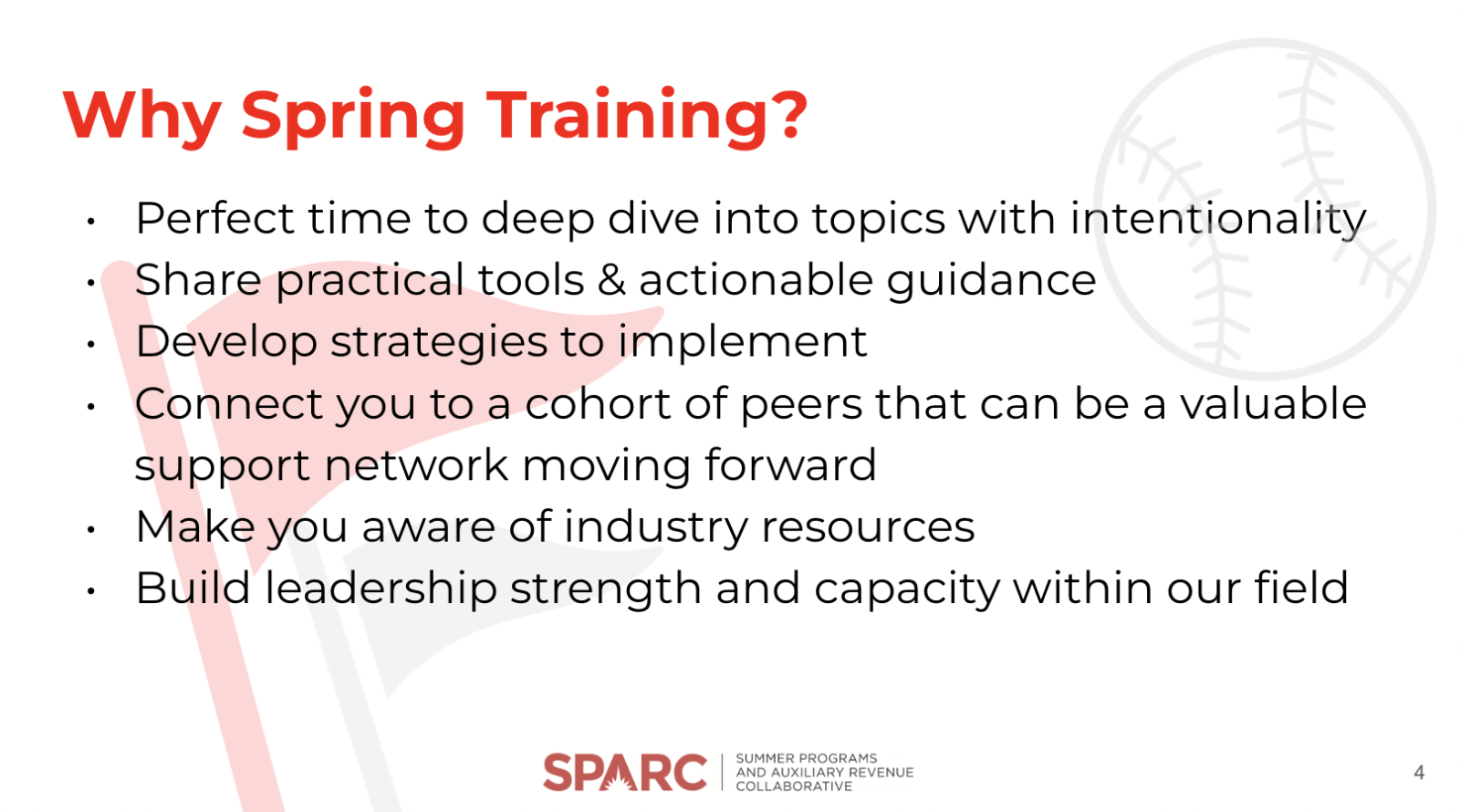Professionalize Your Summer Camp Staff With SPARC's Spring Training Series
SPARC's annual Spring Training Series begins next week, and there is still time to enroll! Taught by SPARC's experienced team of Senior Advisors, the series begins April 2 and runs for three 90-minute sessions. Bob Rojee, Karen McCann McClelland, and David Sullivan will lead the course, highlighting one phase of staff training each week: onboarding, content, and delivery.
In a recent interview, Bob Rojee offered a preview of what participants can expect from this year's Spring Training, covering everything from interviewing prospective staff, supporting them before summer begins, and creating impactful training experiences.

April 2: Onboarding
When asked about the process of hiring summer staff, Bob stressed the need to be intentional. "You start building culture," he says. "It’s important for us as directors to know that for most younger folks, this is their first job, this is something they need to make a commitment to. Being professional all the way through is important."
Because the vast majority of summer camp staff are young adults, they are working with underdeveloped frontal lobes, meaning they weigh risk and responsibility and make decisions differently than adults. Bob says that there's "something really valuable about that younger brain that we want kids to experience. We want them to try things, to make friends, to be silly."
At the same time, directors have to be aware of how to support incoming staff before they begin what for many of them is their first professional experience. "How do we support those young adults to understand they’re making a nine, ten week commitment," Bob says, "and how can we support them from January to June with paperwork, with expectations, and asking all the what-ifs they should start thinking about."
"We want to create a culture that makes counselors want to be here, that they’re role models. They're going to change lives this summer."
--Bob Rojee, SPARC Senior Advisor
April 16: Content
One of Bob's goals is to encourage directors and schools to maximize in-person staff training as much as possible--ideally committing to a one-week training program--stressing that the benefits of having a prepared, professional team are well worth making room in the budget. And supporting incoming staff doesn't have to wait until summer starts; it can run from January to June. "We go to school for years to become a classroom teacher, then spend years practicing and improving, and all of a sudden there’s this 17 or 19 year-old, and we say, 'Here’s 15 kids, go.' It may seem easier in the short term, but what are they getting in their toolbox? How are they improving?"
The most important benefit of a well-trained and empowered staff, according to Bob, is how it fosters a better camp experience for kids. "Maybe little Johnny’s parents are going through a divorce and we were able to give him some stability that summer," he says. "Maybe a kid didn’t want to go to camp but had a great experience because our counselors were cool and fun." Great training makes a great camp experience more possible.
3. April 30: Delivery
Bob says this is the most fun of the three stages of training and the time when directors can have the most impact on their team. "Reading staff handbooks--great. But how much are they absorbing? Videos are great, and you can give them quizzes, but we all know the best way to learn is through experience. We can role play. We can engage ourselves."
The focus is again on directors needing to support the young adult's stage of brain development. For example, a staff member may believe they understand a particular risk--why they should always have line of sight, why they should never be alone with a kid--but how can we know they're truly understanding that risk?
This is why experiential training like role-playing is so impactful, Bob says. "They can imagine being called out because a camper said they kissed. And it’s a he said she said situation, and as a director you’re going to say, why were you alone with this kid? And the counselor says I didn’t do it. Well, why would the camper say that you did?"
In this way, role-playing allows the counselor to have an "aha" moment when they can absorb the real consequences of ignoring a risk. "When they feel that pit in their stomach, it gives them a little bit more to truly understanding why it’s important."
Ultimately, it's the positive impact on young lives that makes great staff training so vital to the camp experience for both kids and counselors. "We want to create a culture that makes counselors want to be here, that they’re role models," Bob says. "Say your grandparents ask you, what are you doing this summer? And you say, I’m going to be a counselor at St. Mark’s Summer. Great answer. But what if instead you said. 'I’m going to change lives this summer.' That starts to shift the pendulum. They’re going to change lives this summer. And we can start that shift beginning right from the onboarding process."
The Spring Training series begins Wednesday, April 2nd and is open to both members and non-members. Last year we helped 92 participants elevate their summer camp training. Register now to grab your spot!
Spring Training is free for SPARC members. Join SPARC today to gain access to a wealth of valuable summer and auxiliary tools, webinars, roundtables, and community support through SPARC Connect.
